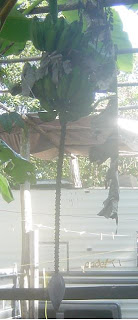A banana tree is growing right outside the camper. We’re told it’s a majunche tree (although I’m not sure if that’s spelled correctly, and it’s not in the Spanish/English dictionary). We’re told the fruits are like bananas, but smaller and sweeter. Right now, it has three bunches in three different stages of growth. The fruits start as a huge flower that comes up out of the center of the branch. The flower appears to be heavy, and it grows up and then flops over and hangs down. The sprout continues to grow, so the flower hangs closer and closer to the ground. As it opens, the petals are crimson and very big. As the flower’s stem gets longer and the petals drop off, the baby bananas are visible above the flower – which is really below it on the stem, but since the bloom droops towards the ground, the bananas appear above it. Over a week or so, the stem gets longer as the shoot grows, the flower gets smaller as the petals drop, and the bananas get bigger. We told to watch them closely when they’re almost ripe because the birds love them, and if we let them go too long on the banana tree, the birds will peck holes in them to eat the bananas.



Tom and Selwyn made very visible progress today. In the morning, Selwyn walked through the horse pasture marking trees that should be saved. Tom followed with the weed whacker and took down all the scrub, then made a few burn piles and hauled all the brush to the piles. Some of the women from next door stopped by and remarked on how much brighter and cleaner the property looks, and the pasture is really starting to look like a pasture, although there are still a few fence lines to be cleared before we attempt to confine Esmerelda or try to turn out another horse with her. While Tom was doing that, Selwyn took his machete and cleaned around the first cabin and took the chicken wire down from the pen off the back, so that area too is starting to look brighter and more used. We’re amazed at how much we’re finding to do that requires little or no expense, but makes a huge difference in making the property look like somebody lives here.
After dinner, we took the carrot cake next door to eat with Marta and Julian’s family. The school kids were doing their homework, and the girls were playing with each other’s hair. Hector handed me his multiplication table, and asked me to drill him. They have to memorize up to 12 x 12, and Hector can spit back all the right answers. He hesitated a little over some of the 12x series, so Tom put on his math tutor hat and took over, and showed Hector how to figure out the problems. He had been French braiding the girls’ hair, so I think he was relieved to find an excuse to get out of that job! We all talked, and drilled each other in English and Spanish, with Tom and I trying to learn Spanish, and the rest of them working on their English. Everything we do involves a lot of laughing, like when they were telling us how to wake somebody up by saying “Levitate, levitate, levitate,” and then telling me how to ask for my ten more minutes. We were also laughing because I had been trying to hurry Tom into doing something, and I’d said “Chop, chop,” and made the hurry up chopping gesture with my hands. In Spanish, they make the same gesture, but say “Aporate, aporate, aporate.” We were all walking around chopping with our hands and saying “Aporate, aporate, aporate, chop, chop,” and laughing. We also discussed how the dictionary doesn’t really give accurate translations, because you still have to know the connotations of the words. However, that works both ways, and we all understand that. The only example I can think of right now is that most Belizeans use the word “molest” when they’re speaking English and telling somebody to leave something alone. “The tarantula won’t hurt you if you don’t molest him,” “Don’t molest your little brother,” and sentences like these are very common, and the Belizeans are entirely unaware that the word has completely different connotations to an English speaking American. But, we all know what’s meant, and we’re all making lots of those mistakes in both English and Spanish, so we’re just trying to learn and work through it. I’m still waiting for the light to come on so that I’ll be able to put sentences together in Spanish without parsing them in my head and then getting all anxious about being wrong, but I’m hopeful that sooner or later it will click.
Even with all the talking, we did sit down and eat the carrot cake. The frosting had soaked into the cake on top, but it was delicious, and the ten of us managed to polish off well over half the cake.



No comments:
Post a Comment